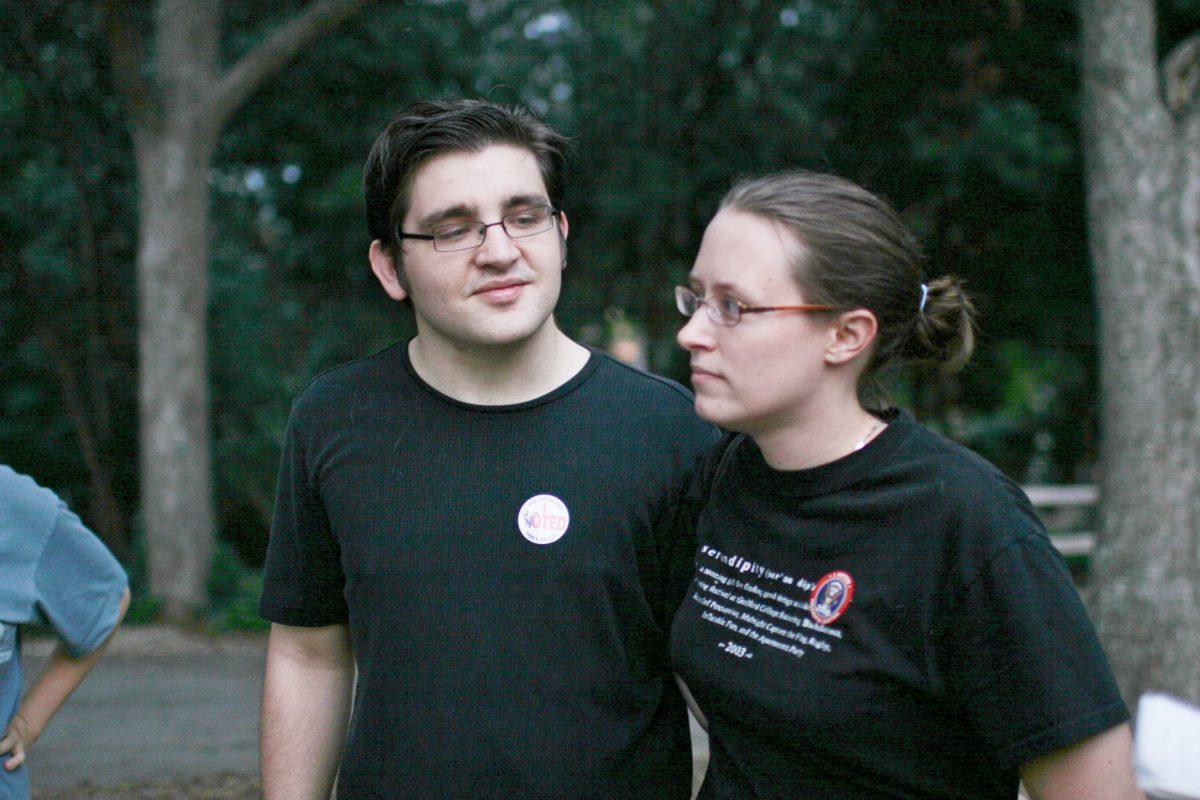North Carolina has the potential to vote for a Democratic presidential candidate for the first time since 1976, and Andrew Taylor, professor and chair of political science, said it’s about a fifty-fifty chance.
“It’s hard to tell either way,” he said.
There are many other states, such as Ohio, Florida, Virginia and Colorado, that voted for George Bush in 2000 too but also have the potential to vote for democratic nominee Barack Obama this year.
North Carolina has the benefit of college towns as well as high numbers of blacks and citizens who have come from other parts of the country, Taylor said.
One reason Taylor said Obama has had such a boost in North Carolina was his heavy campaigning in the state during the Democratic primary in April and May. Some Democrats thought the extended and contentious primary between Sen. Hillary Clinton could have divided the party, but Taylor said the added campaigning gave Obama more recognition across the state.
“It helped him get his name across,” he said. “He had an organization [established], a network of supporters. Time spent creating that campaign organization has been good for him.”
According to Pollster.com, its latest poll of polls has Obama leading Republican rival John McCain 48.7 percent to 46.9 percent.
North Carolina opened up early voting stations Thursday, and Taylor said it largely makes voting more convenient for people already likely to vote.
“The type of people that early vote are going to vote anyway,” Taylor said.
Early voting beginsAbout 1,000 voters, including many students, turned out to the Pullen Arts Center Thursday’s early voting station, according to site supervisor William Britt.
“Usually on the first day, it’s quite crowded,” he said. “Saturday, Nov. 1 is going to be as busy as it can be.”
Stephanie Crenk, a junior in biochemistry, and her friend, Jessica King, a junior in chemistry, voted Thursday. Crank said the state of economy has made this election more important for students.
“I’ve never really been interested in politics until now,” Crank said.
Crank and King are both looking to graduate soon, and after applying to numerous outlets, they said they have not found jobs yet.
Crank said the classes of 2009 and 2010 will likely feel the heaviest effects of the economy, and “the country’s never really been like this.”
Britt has worked in voting sites for about 15 years, he said, and this election hasn’t been too different from others with turnout.
Twenty eight people are on staff at the Pullen Arts Center, and Britt said they could handle any surges in voters.
The workers’ main objective is to keep the voting process secure.
“One of the things you have to be certain about is that nobody walks out with a ballot in their hand,” he said.
Democrats from non-swing states come to N.C. to campaign
Since North Carolina entered its swing-state status, Democrats from all over the country are wanting to campaign in the state to turn it blue.
But they’re not doing it without help.
In one example, the Harvard College Democrats at Harvard University are organizing a trip for up to 275 students to campaign in North Carolina, Georgia and Indiana, with one group coming to Raleigh.
Sam Novey, communications director for the group, said it is working through TravelForChange.org.
“The way the site works, you have volunteers like us who don’t live in swing states, and Travel for Change allows people who don’t have the money to buy a plane ticket to a swing state, [by connecting] them with volunteers who have the money,” he said.
Americans in Italy for Obama is the group supporting the Harvard Democrats on their trip, according to President Jarret Zafran, and the campaigners will come to their assigned state by Nov. 1, to motivate voters to get to the polls.
Zafran said campaigning could also help boost voter return for U.S. Senate candidate Kay Hagan, and other Democratic hopefuls that could overturn Republican incumbents.
“These races that weren’t considered as competitive are now our golden ticket to reach 60 in the Senate,” he said.
These students have had practice campaigning almost every weekend in New Hampshire, a swing state that only requires an hourlong trip, Novey said.
“We’ve had between 60 and 120 people with us every weekend,” he said.
Republicans play defense
While Democrats try to sway North Carolina from red to blue, Republicans are playing defense to keep a conservative in the White House.
Ches McDowell, chair of Students for McCain and sophomore in political science, said an Obama win is a possibility in North Carolina.
“Anything’s possible, but I think in the end, North Carolinians are too smart to go to a blue state,” he said.
There is strong support for Pat McCrory, the republican candidate for governor, and McDowell said that could mean bad news for democrats running in this year’s election.
“I’m pretty sure we’re going to have a Republican governor,” he said. “I just don’t think it’s the year for the Democrats.”
Typically North Carolinians support Democrats that are more conservative than Obama, McDowell said.
Before Obama started gaining in the polls in states like Virginia and North Carolina, Republicans had taken the state for granted, he said.
“If more [candidates] lose in North Carolina and it becomes mixed up, the red starts to disappear a little bit,” he said. “It’s just been taken for granted and now it’s a real possibility that he could win. That steps people up.”
Most of Republican’s efforts now will be phone calls to motivate people to vote.
The stake in this election for both parties makes everyone step up their games, he said.
“It’s going to be a huge turnout on both sides,” he said.








